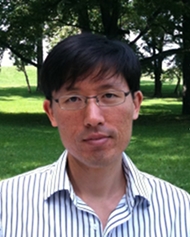Congratulations Mr. Chun!
January 03, 2012

MDiv Student, Daeil Chun, recently won the Bavinck Institute Essay Contest!
Mr. Chun's essay was entitled "Social Darwinism, Coalitions of Abrahamic Religions, and Reformed Social Vision." The contest was in conjunction with the Bavinck Institute's conference on After 9/11/11 . . . What? Reformed Theology and the Church’s Global Mission Today.
How did you hear about the contest? What made you decide to enter?
I heard about the contest while I was taking ‘Christianity in Conflict I,’ a winter course with Dr. Edgar, in 2011. The professor informed the class about the contest, and a poster was also posted on the campus at the same time.
I decided to enter the contest for two reasons. First, I liked the theme of the contest: to think about global mission after 9/11/11. The poster did not provide any further information [about the theme], but I thought this might require some interaction with Islam and Judaism as well. These two religions have been my ministerial and academic interests for a long time, though I learn more each day how ignorant I am about them. Second, the contest required us to interact with J. Bavinck, a nephew of Herman Bavinck. Frankly speaking, I never knew J. Bavinck before this, but he turned out to be a fascinating person. He is, in short, a missionary-theologian (like Irenaeus in the ancient church) who served in the frontier mission field and at the same time skillfully fought against one of the most complicated theological challenges of his day: gnosticism. Finding J. Bavinck as another role model, I thought I should enter this contest for both the academic exercise and for ministry preparation as well.
What is a brief summary of your essay?
My essay uses a hypothetical situation in which three religions, Christianity, Islam and Judaism (in alphabetical order) work together to defend the ethical foundation of ‘creation faith’ in opposition to evolutionary materialism. But if I stopped there, I would be like many typical inter-faith dialogue advocates, whose work is still useful for many people. However, I pressed on to apply Van Til’s ‘point of contact,’ which actually denies any vague points of contact even with those who believe in a creator. On top of that, I supplied Dutch Reformed worldviews [in my essay] to engage the unbelief systems in social spheres, apart from the religious sphere. My conclusion is simple: we can work with Muslim and Jewish peoples for creational social ethics in opposition to evolutionary materialism, but never agree to the extent of developing a new unified religious system based on an abstract idea of a creator. We are Trinitarian, which gives us a two-fold call—to sustain a Trinitarian dogma and to lead our society, including non-believers, toward the Trinitarian social vision. The emphasis lies in doing both tasks at the same time. Admittedly, it sounds great in theory, but is very difficult to do in practice. My essay was simply the product of an agonized seminarian who wants to think right and to act right.
How did your studies at Westminster help you prepare for this essay?
Westminster’s apologetics curriculum is razor-sharp and it also has an encyclopedic interest in global religious contours. Conversing with Islam and Judaism, from experience, demands that we especially use our apologetic intellectual ability, because both religions are so similar to Christianity in many ways, and they are so influential in many spheres of human society including culture, politics, etc. Piecemeal apologetics often seems to be irrelevant in conversing with Muslim and Jewish people. They all believe in one God. They all believe God is love (or God is merciful). So what? Just say yes, and leave? No. The real difference lies in the view of history, the view of Scripture, and ultimately, in the view of Christ — how Jesus culminates and climaxes history and Scripture. All these conversations need a systematic approach, particularly in tough historical contexts such as anti-Semitism, the crusades, 9/11, terrorism, the Arab-spring, etc. There is no place except Westminster where I can discuss these questions openly with a firm conviction in the Trinitarian faith.
Who supported you in your work on this essay?
First of all, I thank my wife, who listens to my daily sermon at the dinner table. I mean, I always parrot what I have learned from my studies everyday (at every meal!) to my wife. She suffered much while I was writing this paper because I just talked and talked about the paper all the time. She not only listened to me but also gave me incisive feedback, applying “so what” tests, or telling me “you are overstating it,” or “that’s simply wrong.” Many times, she was simply correct.
I thank Dr. Edgar for encouraging me to think about Islam from various perspectives. I also thank Dr. Oliphint, who reviewed the preliminary version of the essay, which I turned in as the term paper for his class. I also want to thank Dr. Poythress, whose book on sociology helped me to think about a Trinitarian social view. Finally, I thank Dr. Altena, Director of the Theological Writing Center, who kindly and patiently pointed out many bizarre English constructions and awkward word choices in my essay.







